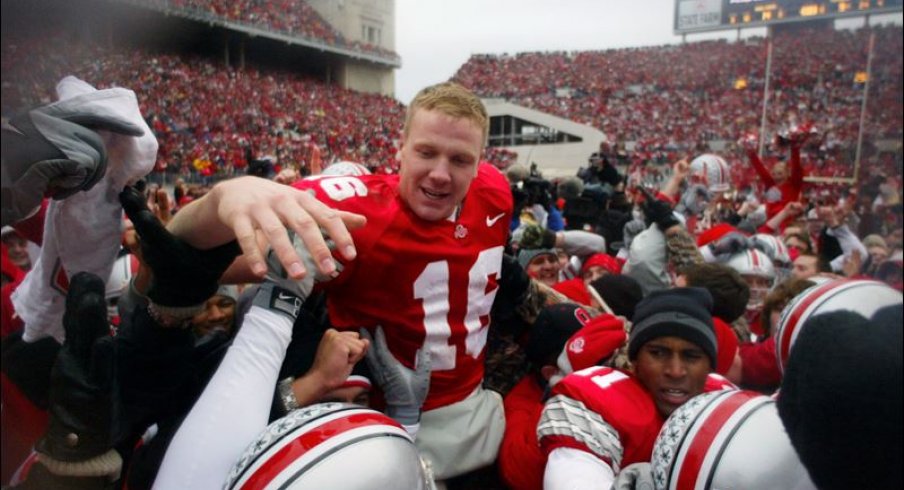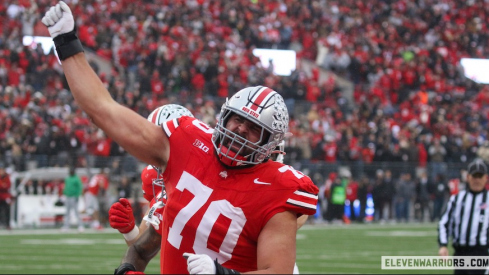Ohio State blows out Indiana, 38-15. Now, it's time to do the same to That Team Up North.
The story of Ohio State's last National Championship team in football is a familiar one, filled with heroics and drama. The 2002 OSU team flirted with disaster on many occasions but survived them all and bested the team that many thought might rank among the best of all time, the Miami Hurricanes.
Unfortunately, the stretch run of that season helped to cement in the minds of OSU fans a notion that had become popular in NFL circles during the early 90s: Defense Wins Championships. The defensive dominance displayed by Jim Tressel's second Ohio State team carried them through a rough November and right into the BCS Championship game. Their dramatic triumph over "the U" (in what was an intense defensive struggle) made sure they would never be forgotten.
Since that season, I have heard the mantra repeated many times, but never with more intensity than after Seattle's recent Super Bowl victory over Denver. The hype leading up to the game was focused on the fact that Denver was the #1 offense and Seattle was the #1 defense, and that we would find out once and for all which factor was more important to winning the highest prize in the game of football.
In the nfl
So there I was at work, on the Monday after Denver's epic meltdown, listening to a pair of guys in the next pod (don't ask) discussing the game and of course throwing out that familiar cliché. So I pointed out to them that this was a myth, and they incredulously confronted me with phrases like "Didn't you see the game yesterday?" and "The team with the best defense always wins."
I replied "Who had the best defense in the NFL last year (in 2012)?" Neither of them had an answer, and so after a moment I answered "Pittsburgh; and not only did they not win the Super Bowl, they didn't even make the playoffs."
The Steelers were indeed the best defensive team in 2012 in terms of yards given up, easily holding off Denver's 2nd ranked defense (!) by some 15 yards per game. Denver also did not make the Super Bowl, although they did make the playoffs, losing at home to Baltimore in the AFC semi-final round. Seattle had the best scoring defense in 2012, and they also did not make the Super Bowl, but they can be forgiven because the NFC's best defensive team in terms of yards, the San Francisco 49ers actually did make it.
San Francisco finished 3rd in the NFL in total defense in 2012. Their AFC opponent, the Baltimore Ravens, finished a distant 17th. That's an easy call; Niners in a walk! Apparently, it's not that simple. In the NFL, the championship is typically won by the best team, whether that team is better at offense or defense or neither (like Baltimore, who was 16th in total offense). All elements of your team need to be operating at a high level when you hit the playoffs or you will go home early.
Given all this, it is surprising to me that this myth endures when it comes to the NFL. I had this same debate several years ago with a friend who was a Vikings fan. His evidence was the 1998 Minnesota team, whose offense roared through the regular season on the strength of a rejuvenated Randall Cunningham and the young wheels of Randy Moss. That Vikings team hit a wall in the playoffs in the form of the Atlanta Falcons, a defensive-minded team that stifled Minny's high-powered offense on their way to the Super Bowl. Surely this proved the point, he said.
I replied that the only reason the Vikings lost was because of a missed chip-shot field goal by a kicker who hadn't missed any field goals the entire season. I added that those same Falcons were rolled in the Super Bowl by the offensive-minded Denver Broncos, who averaged over seven yards per play against Atlanta's vaunted defense. My analysis was the Denver had balance between their running game (led by 2000-yard rusher Terrell Davis) and their passing game (Elway, duh), which made it difficult for Atlanta to defend them.
To be honest, I wish the old myth had held sway in the AFC this season, because I'm a Bengals fan. Cincinnati had the 3rd best total defense in the NFL this season, behind only Seattle and Carolina. They should have sailed to the Super Bowl! Well, we all know they didn't; they couldn't even get past San Diego (23rd best defense) at home.
in college football
But now you will say "It still holds true in the college game, and the 2002 Buckeyes are a prime example." My reply is that was a great team, led by a coach who had experience in championship games, and that they excelled in all phases of the game: offense, defense, and special teams. To be sure, that was a special defensive unit. But I truly believe the 2002 offense has not been given its due.
Because of late-season offensive struggles against teams like Penn State, Purdue, and Illinois, fans got the idea that Ohio State was deficient on offense overall that season. What they forget is how the offense rolled during the early part of the season. In total, this Buckeye team scored over 50 points twice, scored in the 40s on two other occasions, and in the 30s on two others (with an asterisk, because that Miami game went into double-overtime).
In their first three games, the 2002 Buckeyes scored a total of 121 points. Neither the 2005 or 2006 Buckeyes, generally thought to be the best offensive teams of the non-vacated Tressel era, scored over 100 points in their first three. Only once during that two-year span did OSU score 50 points or more, while the 2002 team did it twice. Overall the 2002 team averaged 29.3 points per game; not earth-shattering numbers but not exactly feeble either.
The biggest factor that held back the OSU offense in 2002 was the injury problems of star running back Maurice Clarett. After an epic 230-yard rushing performance against Washington State, Clarett had knee surgery and had to sit out the next game against Cincinnati. The Buckeye offense struggled without Clarett on the sloppy pre-turfgrass field at Paul Brown Stadium (it had more divots than the fairways at Airport Golf Course), but still put up 23 points. As it turned out, UC was not a terrible team, and they actually played in a bowl game that season.
Clarett eventually returned but was in and out of the line-up and never at full strength until the Michigan game. His absence was keenly felt, as backups Lydell Ross and Maurice Hall never quite measured up to their lofty high-school accolades. Still, even without Clarett they laid 34 points on Minnesota in a game mostly forgotten after the struggles at Purdue and Illinois.
This leads to another overlooked factor: the schedule. The Big Ten was a strong league in 2002, and they proved it by going 5-2 in bowl games, led by OSU's victory over Miami. Two of Ohio State's other non-conference foes, Texas Tech and Washington State, won nine and ten games respectively, with WSU finishing in the top ten.
And then there's Miami. While it is true that the OSU offense only scored 17 against them, this is actually not bad considering the talent they faced. The Hurricane defense featured future NFL stars Sean Taylor, Jonathan Vilma, D.J. Williams, and Vince Wilfork, all of whom were drafted in the first round of the 2004 NFL draft.
That's enough, you say; one season does not prove the point but what about all those championships won by SEC teams? Did not all of those teams have dominant defenses? Well, some did but others not so much.
The best argument for keeping the myth alive in the college game is the back-to-back championships won by Alabama in 2011 and 2012. While it is true that Nicky Satan's troops were dominant on defense in those seasons (especially in 2011), their offense might be a bit overlooked. In 2012 alone, the Tide scored over 40 points eight times in 12 games, including one 52-point outburst (Sayonara, John L. Smith) and two 49-pointers.
The 2011 Tide offense was also potent, scoring over 40 points five times and hitting 37 or better on three other occasions. They were stifled by LSU's dominant defense in the regular season, but they rebounded in the BCS Championship game to score 21 against the Tigers. Still, you could say great defense is what defined Alabama, but the argument is hard to apply when considering the teams that won it all in 2006, 2008, 2010, or 2013.
Yes, let's talk about the most recent season. I notice there were no pundits spouting the old cliché after FSU defeated Auburn 34-31 in the final BCS Championship game. Auburn could easily have won the game, which would have been quite a blow to the defenders of the myth considering that Gus Malzahn's team wasn't exactly winning with defense against Alabama or Missouri.
Where does this all leave us? I'm sure there is some detailed analysis that someone can do to find out what makes some teams victorious while other seemingly championship-worthy teams fall flat. That would take more work than simply shooting down one overworked myth. As it turns out, it's already been done anyway. So why go through the exercise again?
After the numerous defensive lapses in OSU's last three games this season, it became obvious that the lack of a great defense — heck, I'd take an adequate defense — is what kept the team from championship glory. It is tempting to resurrect the old myth in order to salve the wounds inflicted by MSU and Clemson.
Would I like to have a dominant defense every season? Certainly. I would also like to score 50 points every game. Failures on either side of the ball are frustrating (remember the 2009 USC game?).
Let's just remember that soothing our frustration is no substitute for good analysis. There are enough clichés already in the sports world, and some of them are even amusing. But I think it's time we put this one to rest for good. Give it a decent burial, but make sure it stays buried.


